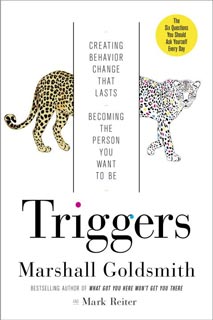Triggers: Creating Behavior That Lasts—Becoming the Person You Want to Be
May 14, 2015
Marshall Goldsmith teaches us that regret can be a powerful impetus to begin behavior change, and teaches us a way to do it as adults.

Triggers: Creating Behavior That Lasts—Becoming the Person You Want to Be by Marshall Goldsmith, Crown Business, 272 pages, $27.00, Hardcover, May 2015, ISBN 9780804141239
Adult behavior change is extremely difficult, as any number of colloquialisms attest. No one knows this better than Marshall Goldsmith, who—as perhaps the premier executive coach working today—has made a career out of helping others accomplish it. Having been at it for more than thirty-five years, he has also been able to develop a process for it that is remarkably straightforward. Still not easy, but simple.
His classic, What Got You Here Won’t Get You There, is probably the best book out there for successful people who want to become even more successful. What he provides his executive clients is a feedback loop of evidence, relevance, consequence, and action. What he provides readers in his new book, Triggers, is the knowledge to create this same feedback loop for yourself, and the ability, if you’ll provide the discipline, to create and control your own environments—if not external, then internal.
And it all starts with a powerful emotion most of us say “no” to—regret.
For such a penetrating and wounding emotion, regret doesn’t get much respect. We treat it as a benign factor, something to deny or rationalize away. We tell ourselves, “I’ve made stupid choices but they’ve made me who I am today. Lamenting the past is a waste of time. I learned my lesson. Let’s move on.” That’s one way to look at regret … I want to suggest a different attitude, namely embracing regret (although not too tightly or for too long). The pain that comes with regret should be mandatory, not something to be shooed away like an annoying pet. When we make bad choices and fail ourselves or hurt the people we love, we should feel pain. That pain can be motivating and in the best sense, triggering—a reminder that maybe we messed up but we can do better. It’s one of the most powerful feelings guiding us to change.
Really, there is no reason to change if you don’t regret the ways you affect people or what you’ve become in some fundamental way or another—if you feel that who you are or were meant to be isn’t aligned with who you actually are, or are perceived to be. What Marshall is telling you is, simple, “use it,” and know who you're using it for.
This is not a book about stopping a bad habit such as smoking cigarettes or dealing with your late-night craving for ice cream. Nicotine and ice cream are not your constituency here. It’s about changing your behavior when you’re among people you respect and love. They are your target audience.
The book is anything but preachy (as he says, his mission is “to help people become the person that they want to be, not tell them who that person is), and Marshall offers up his own past challenges and changes—from accepting the fact that he’s a bald man and abandoning the comb-over in his twenties, to what he did in response to becoming increasingly unproductive as in-flight entertainment options expanded on his frequent plane travels for work, to wanting to be 10 pounds lighter and deciding maybe he didn’t really need to be—to personalize the process, and perhaps let you know that it’s okay not to be perfect, if in some ways what you are is “good enough” for you and those around you. And, of course, there’s a wealth of stories from his executive clients to bring all these lessons home, as well.
What they all demonstrate is that, regardless of how “stuck in your ways” you’ve become, there is hope to become unstuck, to change, to become the best you that you can be, to become the person you want and know you can be. So, whether you want to be less dictatorial or distanced at home, more friendly and easier to approach to your employees at work, or you just want to be a better neighbor, with Marshall’s help and methodology, perhaps we can teach old dogs, and ourselves, new tricks.



